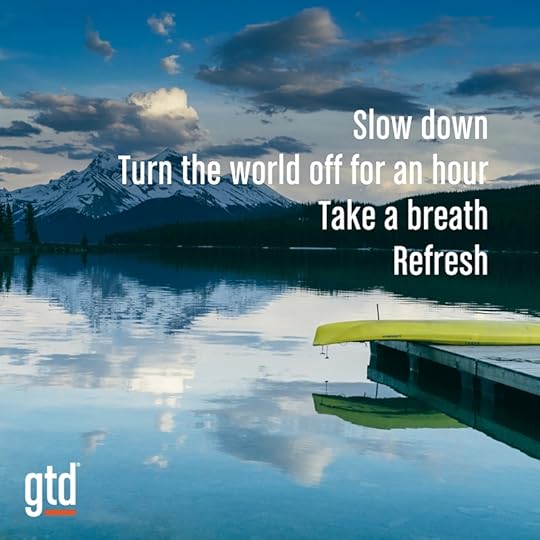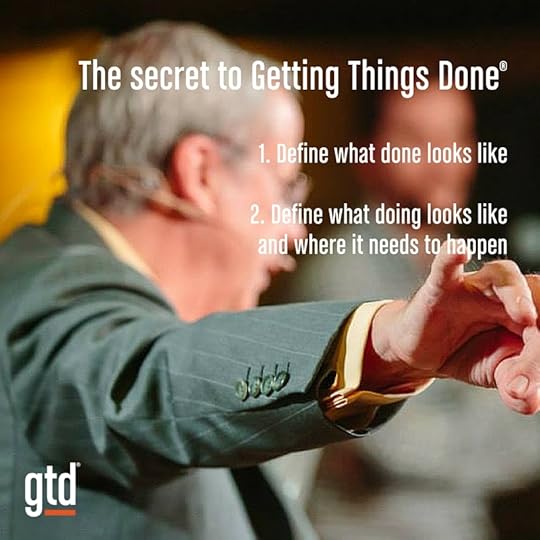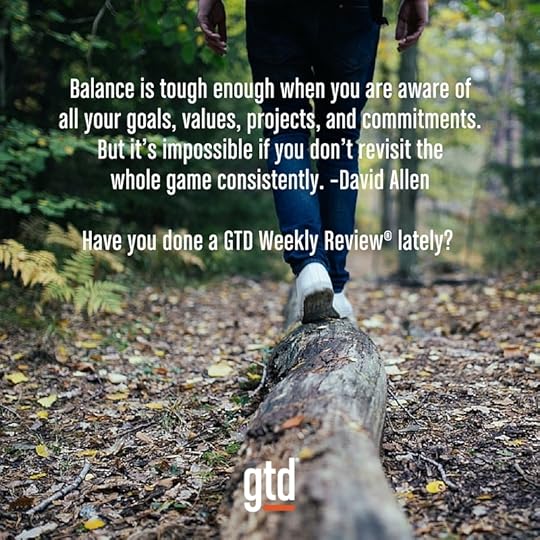David Allen's Blog, page 53
May 8, 2016
Episode #15 – David Allen at The Do Lectures
David gives a unique and inspiring presentation about the power of Getting Things Done to the participants of The Do Lectures in Wales, September 2010. If you’re new to GTD, you’ll love the fast-paced overview David gives of the entire systematic approach. If you’re a seasoned practitioner, you’ll appreciate the transparency and authenticity in which David shares a bit more of his behind-the-scenes story.
Listen Now
Subscribe or Download
May 4, 2016
Think! At least once a week…
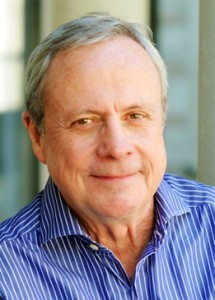 I followed up with an executive client recently whose biggest issue was that his GTD Weekly Review, when he “really did it right,” took sometimes 3–4 hours. He wondered if he was doing something wrong. I asked if it was worthwhile doing the review, and he admitted that it was critical to stay on top, but that it was “work” to keep it up. It didn’t ultimately seem to save him more time.
I followed up with an executive client recently whose biggest issue was that his GTD Weekly Review, when he “really did it right,” took sometimes 3–4 hours. He wondered if he was doing something wrong. I asked if it was worthwhile doing the review, and he admitted that it was critical to stay on top, but that it was “work” to keep it up. It didn’t ultimately seem to save him more time.
The truth is, it probably won’t save you more time—well, it will, but you will need that extra time to do the reviews and keep lists and categories of items current. Yes, you can get better and faster at how you do it. But it requires investment, no matter how good you are at it. As a matter of fact, the less you have time to do it, the more time you usually need to spend with it!
No personal management system can possibly come close to creating the perfect algorithm that will tie in all the factors of time, people, projects, actions, and support information with the infinite number of variables that go into our thinking about priorities, interests, and commitments. That’s why it becomes critical—once these are somehow objectified into an external system—that they be put in front of our conscious thinking process at least once a week, to get it all recalibrated to match our new realities. And I guarantee that there are some intuitive “Aha’s” lying dormant, only to be triggered by putting reminders about all the meaningful aspects of our life and work in front of our face on a regular basis.
The Weekly Review really is the glue that keeps it all together. And I know there are people out there trying to implement GTD who haven’t tried it. So until then, I must get up on the rooftop and yell at my loudest: “Weekly Review! Weekly Review! Weekly Review!”
Discover what it’s like to have the freedom to be dumb and happy, just following your intuitive hunches, 6.5 days of the week!
For more essays like this, subscribe to David’s free Productive Living Newsletter.
April 29, 2016
April 26, 2016
Episode #14 – Managing Multiple Roles Using GTD
When you listen to this interview with Jeff Heilman, you’ll be amazed how much he does. He’s got a thriving sales career, plus he’s a pro golfer. And a husband, and a father, and much more. Jeff says he always dreamed of becoming the guy who has his act together, and GTD is the pathway. In this interview, he talks with Mike Williams about how he heard about GTD, and his subsequent installation and implementation journey. Somewhere along the way, he says he was able to take on more work than his boss could give him. Now that’s saying a lot. But beyond work, Jeff says that “GTD leads to the freedom to pursue what I choose.”
Listen Now
Subscribe or Download
April 25, 2016
How to get “in your zone” with GTD
Our Certified Partner in India, Calm Achiever, sat down with David to find out how people can get into their zone with GTD.
April 18, 2016
April 1, 2016
Episode #13 – David Allen and The Simpsons Writers
What happens when you cross GTD with one of the world’s most successful TV comedy shows? You’ll find out in this high-energy and humorous dialog between David and three of the writers of The Simpsons. Listen to Rob LeZebnik, Dan Greaney, and Danny Chun share how, in a unique professional environment, they produce creative comedy by committee.
Listen Now
Subscribe or Download
March 30, 2016
The search for the best To Do app
David Allen weighs in on Wired.com’s search for the best To Do app. Could it be that low tech wins the race? Read Wired’s article, “It’s 2016. Why Can’t Anyone Make a Decent Freaking To-Do App?”

March 26, 2016
March 19, 2016
Take the GTD-Q
How well are you doing with your control and perspective? Are you a Crazy Maker, Captain and Commander, Responder, or Micro Manager? In less than two minutes, the GTD-Q will give you visual results about your current reality, describe your strengths, and offer opportunities for improvement. Take the Assessment now.
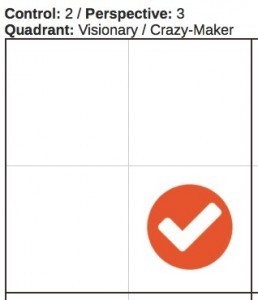
David Allen's Blog
- David Allen's profile
- 1484 followers


